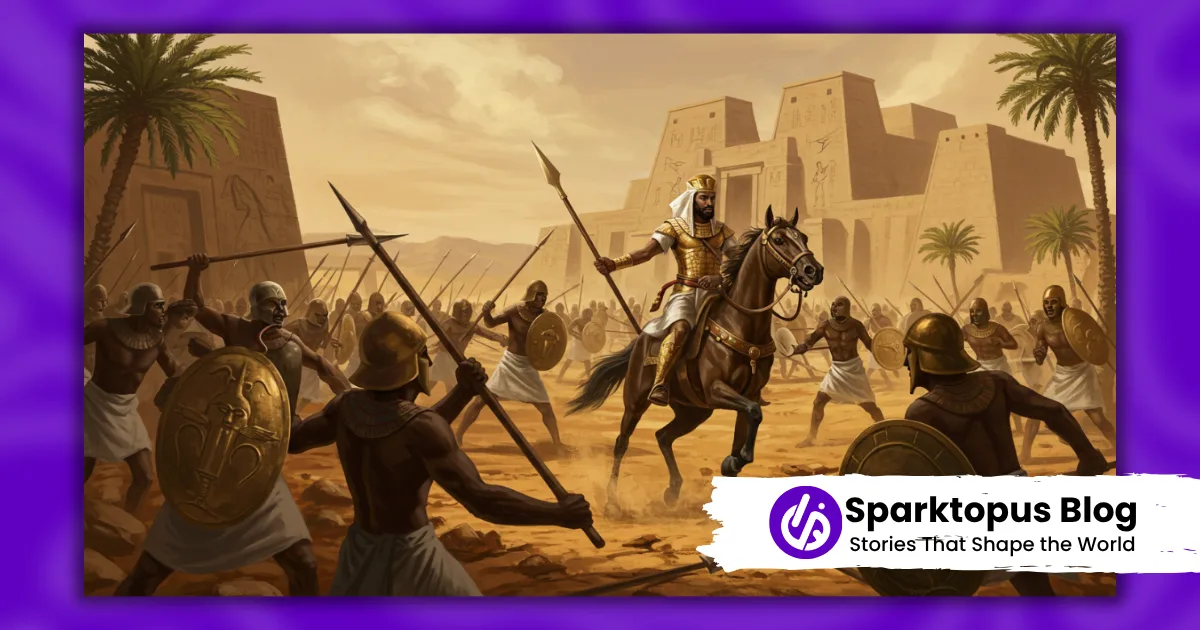
When most people think of ancient civilizations, names like Rome, Greece, China, and Egypt come to mind. While these cultures indeed shaped the world, Africa’s rich tapestry of empires—outside of the Nile Valley—often remains overshadowed in mainstream historical narratives. From the sand-swept cities of the Sahara to the rainforest kingdoms of Central Africa, the continent is home to some of history’s most sophisticated, powerful, and innovative societies. These are the 7 forgotten empires of Africa, tell a compelling story of resilience, creativity, and global influence that deserves center stage.
1. The Kingdom of Kush: Egypt’s Southern Rival
Rise of a Nubian Power
Before the birth of Christ and long after the fall of the Egyptian Old Kingdom, the Kingdom of Kush rose along the Nile Valley in what is now Sudan. With its capital at Napata and later Meroë, Kush flourished as a powerful trading empire that rivaled Egypt in military and cultural power.
Kushite Pharaohs of Egypt
In an incredible twist of fate, the Kushites conquered Egypt around 750 BCE. This marked the start of Egypt’s 25th Dynasty, led by Kushite kings such as Piankhi and Taharqa, who ruled all of Egypt and revived many of its traditions. These rulers built grand temples and pyramids that still dot the Sudanese landscape today.
Contributions and Legacy
Introduced iron smelting to the Nile region
Influenced Egyptian religious and architectural traditions
Built hundreds of pyramids—more than Egypt
Advertisement
Despite its power, the Kingdom of Kush is often ignored in global history curricula. Yet its influence on ancient Northeast Africa was monumental.
2. The Mali Empire: West Africa’s Golden Era
The Empire of Gold and Scholarship
At its peak in the 14th century, the Mali Empire was one of the wealthiest and most influential states in the world. Centered in West Africa, it controlled trade routes connecting the Sahara, the Sahel, and the forest regions. Its capital, Timbuktu, became a global symbol of wealth and knowledge.
Mansa Musa: The Richest Man in History
No discussion of Mali is complete without mentioning Mansa Musa, the empire’s most famous ruler. His 1324 pilgrimage to Mecca caused such a splash that it devalued gold in parts of the Middle East due to the sheer quantity he gave away.
Centers of Learning
Mali wasn’t just about gold; it was a beacon of Islamic scholarship. The Timbuktu Manuscripts, thousands of documents on astronomy, medicine, law, and literature, remain a testament to the empire’s intellectual sophistication.
3. Great Zimbabwe: The Stone City of Mystery
A Monumental Civilization
Rising in the highlands of Southern Africa, Great Zimbabwe thrived from the 11th to the 15th centuries. The city was the center of a powerful kingdom that controlled regional trade in gold, ivory, and cattle. Its most stunning feature? Massive stone structures built without mortar.
Trade Networks
Archaeological findings indicate that Great Zimbabwe had extensive trade connections reaching as far as China, Persia, and India. Artifacts such as Ming dynasty porcelain and Arabian glass beads have been unearthed within its walls.
Colonial Erasure
Colonial powers tried to deny that Africans built Great Zimbabwe, attributing it instead to “foreign architects.” Today, historians confirm that this majestic city was constructed by indigenous Africans, primarily the Shona people.
4. The Kingdom of Axum: Africa’s Christian Beacon
A Powerful Trade Empire
Located in modern-day Ethiopia and Eritrea, Axum was one of the most powerful ancient kingdoms in East Africa. From around 100 CE to 940 CE, it controlled trade across the Red Sea and beyond, minting its own coins and building towering obelisks that still stand.
Adoption of Christianity
Axum was among the first empires in the world to adopt Christianity as a state religion, even before Rome. This heritage continues today in the Ethiopian Orthodox Church, one of the oldest Christian denominations.
Global Influence
Axum was so influential that it was listed among the world’s four great powers by 3rd-century Persian inscriptions, alongside Rome, Persia, and China.
5. The Songhai Empire: Masters of the Niger
A Military Powerhouse
After Mali’s decline, the Songhai Empire rose as the dominant power in West Africa in the 15th and 16th centuries. Its capital, Gao, was a hub of trade and politics, while Timbuktu remained a center of learning.
Sunni Ali and Askia Muhammad
Under leaders like Sunni Ali, who expanded Songhai’s territory dramatically, and Askia Muhammad, who reformed its administration and embraced Islam, the empire became a model of governance and military strength.
Fall and Legacy
Despite its fall to Moroccan invaders in 1591, Songhai’s administrative and scholarly achievements laid a foundation for future African governance models.
6. The Kingdom of Benin: Artistry and Architecture
A City of Walls and Bronze
Founded around the 11th century in what is now Nigeria, the Kingdom of Benin is famous for its bronze sculptures and meticulously planned city layout. Benin City was encircled by massive earthworks, one of the largest man-made structures in the world.
Benin Bronzes
The bronzes—depicting court life, battles, and mythology—demonstrate incredible artistic skill. Many were looted during the British Punitive Expedition in 1897 and now reside in European museums, although efforts for repatriation are ongoing.
Governance and Culture
Benin’s centralized monarchy, led by the Oba, oversaw a stable and highly organized society. The Oba’s court was a center of innovation and ceremonial grandeur.
7. The Kingdom of Kongo: Diplomacy and Faith
A Coastal Power
The Kingdom of Kongo emerged in the 14th century along the western coast of Central Africa. It quickly established itself as a trade and military power with connections to Europe.
Relations with Portugal
Kongo had diplomatic ties with Portugal as early as the 15th century. Its rulers embraced Christianity, and many Kongo elites learned to read and write Portuguese and Latin.
Collapse and Legacy
While internal conflicts and colonial interference weakened the kingdom, its story represents a sophisticated African society capable of global diplomacy and adaptation.
Why These Empires Were Forgotten
Despite their grandeur, these African empires were largely erased or marginalized from global history for several reasons:
Colonial propaganda: European colonizers often portrayed Africa as a continent without history to justify domination.
Destruction of cultural records: Invasions, looting, and war destroyed many historical documents and monuments.
Eurocentric education: Western curricula have long focused on European achievements, ignoring others.
But as global conversations about history and identity evolve, these narratives are finally being rewritten.
Reclaiming African Heritage Today
Modern African nations are increasingly embracing their pre-colonial pasts as sources of pride and identity. From museum repatriation efforts to cultural tourism, the continent is reclaiming its heritage:
Digital archives of ancient manuscripts are being preserved and shared online.
Museums in Nigeria, Ethiopia, and Sudan are being expanded to celebrate local history.
Youth movements across Africa are demanding the return of stolen artifacts.
Conclusion: A Continent of Civilization
The forgotten empires of Africa are not mere footnotes—they are cornerstones of global history. Their achievements in architecture, governance, art, trade, and science rival any empire on Earth. Reclaiming these stories isn’t just about setting the historical record straight; it’s about honoring the resilience, brilliance, and humanity of African civilizations.
As the world turns its gaze toward a more inclusive historical narrative, the voices of Kush, Mali, Benin, Axum, Songhai, Kongo, and Great Zimbabwe are echoing once more. It’s time we listened. You may also like to read: 10 Most Influential Leaders in World History.
Reference: List of kingdoms and empires in African history.
Never miss an update! Click the notification bell icon to allow post notifications and follow us @SparktopusBlog on all social media to stay updated!








